


The Nintendo Keynote In Depth 105
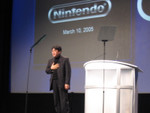 President Iwata began the talk by announcing that he has some conflict within himself in his role as president. He's only a President on his Business Card, he said. In his mind, he's a Game Designer. And in his heart, he's just a gamer. He began programming games on his pocket calculator, with no games, and became attached to Nintendo by being a part of the small Hal design company. Hal, he stated, came from the computer in 2001 a space Odyssey because the name sounded cool. The company created the Kirby and Earthdawn titles, and as time went on he found himself working full time for Nintendo.
President Iwata began the talk by announcing that he has some conflict within himself in his role as president. He's only a President on his Business Card, he said. In his mind, he's a Game Designer. And in his heart, he's just a gamer. He began programming games on his pocket calculator, with no games, and became attached to Nintendo by being a part of the small Hal design company. Hal, he stated, came from the computer in 2001 a space Odyssey because the name sounded cool. The company created the Kirby and Earthdawn titles, and as time went on he found himself working full time for Nintendo.
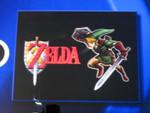 He's been making games, then, for almost two decades, and he discussed some of the things that have changed and some of the things that have stayed the same in the business since then. Overall, he saw most of the changes be to size. Bigger budgets, bigger complexity, bigger attention from worldwide media. On the other hand, there are fewer risks, fewer visions, and fewer ways of thinking about players and games.
He's been making games, then, for almost two decades, and he discussed some of the things that have changed and some of the things that have stayed the same in the business since then. Overall, he saw most of the changes be to size. Bigger budgets, bigger complexity, bigger attention from worldwide media. On the other hand, there are fewer risks, fewer visions, and fewer ways of thinking about players and games.
To respond to this, Nintendo has committed itself to not abandoning the core gamers. Metroid Prime will be out later this year, and the demo shipped with the DS system. Geist is going to be a new and interesting version of a shooter, Zelda appeals to hard-core gamers and regular gamers alike, and Resident Evil 4 is a GC exclusive.
On the other hand, Nintendo is really trying to push out of the current player base and into the market beyond. The DS is their flagship for this effort, and they've currently sold 4 Million units (with the European launch of the system today). Mario Kart DS is an upcoming title for the system, will bridge the gap for both new and old gamers, and is going to utilize wireless play to let up to 8 people play together. Beyond that, though, they really want to give players more than just what they already know they want.
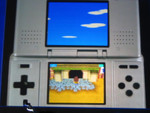 To that end, DS Wifi will be rolling out by the end of the year. The goal of the system is to allow gamers to play together over large distances, simply and seamlessly. Most importantly, the service is going to be completely free of charge. This service will hook people who have never used wifi services before into a new arena of technology, and their new style of games will reach out to people who don't really want to play "games". Nintendogs has already received a lot of press, and is one of these tools to reach out to the non-gamer. If you'd like a look at a portion of the Nintendogs presentation, you can view that here. They didn't reveal anything terribly new, but did show off the microphone capability of the game. The person demoing Nintendogs would whistle, and the dog would come running. By issuing voice commands that he'd pre-selected the virtual critter would perform for him. Even more interesting was the non-game they showed off entitled ElectroPlankton. The music/sound experiment utilizes the microphone as well, and you can see three portions of the game here, here, and here.
To that end, DS Wifi will be rolling out by the end of the year. The goal of the system is to allow gamers to play together over large distances, simply and seamlessly. Most importantly, the service is going to be completely free of charge. This service will hook people who have never used wifi services before into a new arena of technology, and their new style of games will reach out to people who don't really want to play "games". Nintendogs has already received a lot of press, and is one of these tools to reach out to the non-gamer. If you'd like a look at a portion of the Nintendogs presentation, you can view that here. They didn't reveal anything terribly new, but did show off the microphone capability of the game. The person demoing Nintendogs would whistle, and the dog would come running. By issuing voice commands that he'd pre-selected the virtual critter would perform for him. Even more interesting was the non-game they showed off entitled ElectroPlankton. The music/sound experiment utilizes the microphone as well, and you can see three portions of the game here, here, and here.
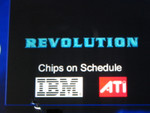 The Revolution was only mentioned, but they did give out some new and interesting information. It will be completely backwards compatible with the Gamecube, ensuring that the most popular of the current stable of games will be available into the future. As with the DS, it will also be wifi enabled for mysterious purposes that they didn't really go into. Their chips and technology are completely on track, and more will be revealed at E3.
The Revolution was only mentioned, but they did give out some new and interesting information. It will be completely backwards compatible with the Gamecube, ensuring that the most popular of the current stable of games will be available into the future. As with the DS, it will also be wifi enabled for mysterious purposes that they didn't really go into. Their chips and technology are completely on track, and more will be revealed at E3.
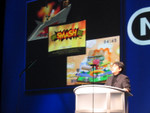 Overall President Iwata was a very arresting speaker. He had excellent delivery, his message was one of change and a new look at gameplay, and he was promising more of what we already know to be good gaming experiences. As they were two of the largest events at the conference, comparing the Nintendo and Microsoft speeches is a must. In general, the "yay Nintendo" aspect was just as much of a commercial endeavor as existed in the Microsoft keynote. Iwata was taking the opportunity to promote his company's vision of the future, and that naturally trends towards the products and services fo the company he represents.
Overall President Iwata was a very arresting speaker. He had excellent delivery, his message was one of change and a new look at gameplay, and he was promising more of what we already know to be good gaming experiences. As they were two of the largest events at the conference, comparing the Nintendo and Microsoft speeches is a must. In general, the "yay Nintendo" aspect was just as much of a commercial endeavor as existed in the Microsoft keynote. Iwata was taking the opportunity to promote his company's vision of the future, and that naturally trends towards the products and services fo the company he represents.
At the same time, though, I felt a lot more hopeful listening to President Iwata than I did listening to Allard. The "HD Future" isn't much to get excited about. A Gamer's card and higher resolution isn't something that really leaps beyond the norm of what we have today. Incremental changes are needed, of course, but keynotes are meant to fire the blood. Iwata did that more effectively through the invoking of something that everyone in the room had in common: "The Heart of a Gamer". Nintendogs and Electroplankton may not be the way to make this industry sell its first 20 million unit title, but like the analogy that Iwata used in speech, they're definitely not of this gaming world. And exploration is something that I think is on far too few peoples minds in the gaming industry today.
Video of the speech? (Score:2)
Re:Video of the speech? (Score:3, Informative)
Re:Video of the speech? (Score:4, Informative)
Re:Video of the speech? (Score:1, Redundant)
Audio...Yes. [nintendo.com]
Re:Video of the speech? (Score:4, Informative)
Here's the direct link to the video stream on Gamespot [gamespot.com].
And here is the page where you can find the link to the stream [gamespot.com] if the other link doesnt work.
Next Gen Handhelds will be interesting (Score:5, Interesting)
If Nintendo's wifi access works, I think it will, in short, make maintain Nintendo's dominance. One of the reasons for X-box popularity is the live system, and no one's really tried anything similar for handheld. Additionally, Nintendo has some really fun multiplayer games (Mario Party, Mariokart, Metroid Prime 2, and Smash Bros) that go beyond the stereotypical FPS. If these are ported to the new handheld system AND the wifi works, I think it's going to be hard to find a company to beat Nintendo's appetizing combination of great games and easy multiplayer.
Re:Next Gen Handhelds will be interesting (Score:4, Funny)
One of the reasons for X-box popularity is the live system, and no one's really tried anything similar for handheld.
*cough* N-Gage Arena *cough*
Re:Next Gen Handhelds will be interesting (Score:1)
Re:Next Gen Handhelds will be interesting (Score:3, Funny)
Indeed studies have gone so far as to suggest upwards of 75% of all jokes would achieve much more laughter if their punch lines were simply replaced with the word "N-Gage".
Re:Next Gen Handhelds will be interesting (Score:1)
Re:Next Gen Handhelds will be interesting (Score:1)
N-Gage is a joke
Re:Next Gen Handhelds will be interesting (Score:2)
But PSPs also have WiFi... it's not unreasonable that Sony might put WiFi into the PS3 to interoperate with PSP.
As for the rest of your comment... games that go beyond the stereotypical FPS? When console games were invented the FPS didn't exist because the CPU power wasn't there. What the heck are you trying to say? There's non-formula games on all platforms, whereas the Nintendo games you mention are all
Re:Next Gen Handhelds will be interesting (Score:2)
FPS didn't exist on anything for a while. Doom actually came out on SNES and Atari Jaguar (I've played both versions, and they don't really differ much from the PC). What I mean is that on consoles for a very long time, the game of choice was an FPS of some sort: GoldenEye, Socom, Halo, etc. If it wasn't that, it was some sports ga
Re:Next Gen Handhelds will be interesting (Score:2)
Yeah, except Powerstone and Powerstone 2 on the DC.
You must not be visiting PC gamers - I play FPSes on my PC. Granted, I do mostly play Gamecube now, but only because I don't have a PS2 right now. Ni
Re:Next Gen Handhelds will be interesting (Score:2)
I think intelligent camera handling is and will always be the biggest problem with any 3D platformer. The only games I thou
Re:Next Gen Handhelds will be interesting (Score:1)
That's fine because I have an unhealthy addiction to 3d platformers.
Free Zelda Trailer Link (Score:2, Informative)
High
http://media.nintendo.com/mediaFiles/5293
Low
http://media.ni
Re:Free Zelda Trailer Link (Score:3, Interesting)
Re:Free Zelda Trailer Link (Score:5, Interesting)
Re:Free Zelda Trailer Link (Score:1)
Re:Free Zelda Trailer Link (Score:1)
I guess I am not sure which Metroid remakes you are referring to. Metroid Prime was not a remake nor was Metroid Prime 2. MP2 is a sequel. It didn't innovate its gameplay as much as it could have, but it was still its own new and unique game.
It seems to me that you consider anygame that features Ma
Re:Free Zelda Trailer Link (Score:5, Informative)
Since you refuse to count the platformers as unique games by virtue of the fact that they're all oriented around the rescuing of princesses...
- Mario Is Missing
- Super Mario Kart (et al)
- Mario Tennis
- Mario & Wario (Japan and EU only)
- Mario's Picross
- Super Smash Bros.
- Super Mario RPG/Paper Mario/Superstar Saga
- Yoshi's Safari
- Mario Paint
Didn't take me long to make that list.We just got the second remake of Zelda 1 - third if you count the Satellaview remake that was only partially finished.
Excuse? There's never been a remake of Zelda - a ported re-release to the GBA, yes, but not a remake. And there aren't a whole lot of people with portable (or even functional) NES decks out there, so the $20 price tag was well worth it to me.
Two remakes of Link to the Past, one of which had a rehash of Four Swords included, and supposedly the second to Link's Awakening is on the way.
Now I know you're just blowing smoke. LTTP has only had one "remake" in the form of the GBA release. It was much more of a port than a release, since the differences between the SNES and GBA version are the voices, the extra final dungeon, the riddle game, and a couple of other very minor gameplay changes. The graphics and audio are otherwise identical.
Further, since the GBA game was the first game to feature the Four Swords game, it cannot possibly be a "rehash" of Four Swords, since there was no Four Swords to precede it. Four Swords Adventures came out over a year after the GBA "remake" of LTTP, and it was so expanded beyond the original game that was really more of a sequel than a simple port.
Metroid is only on its first round of remakes right now, but they're busy bees with that.
Metroid: Zero Mission is the only "remake" the series has ever had, and it's got so much new stuff in it that it's almost a completely new game. Completing the "Metroid" portion of the game takes less than 25% of the game's overall playability.
I'll give you the complaints about Pokemon, but I have played some of the series, and truthfully, Fire Red/Leaf Green are the only "remakes" in the entire series. It sounds more like you're grousing about the way games are played in general. Hell, using your logic, there hasn't been a new RPG since Wizardy came out back in 1981. And you probably can't stand pinball games either.
Either that or you're just a bitter Sega fanatic.
Re:Free Zelda Trailer Link (Score:2)
FSA was a sequel. It had entirely different levels, story, etc. than FS, not to mention that it was played in an entirely different way (GC-GBA connectivity vs. linked GBAs). Good game, BTW, if you have the cost of entry already taken care of.
Re:Free Zelda Trailer Link (Score:3, Interesting)
And Madden 2005 included the "Hit Stick". Just sayin'.
Re:Free Zelda Trailer Link (Score:1)
Re:Free Zelda Trailer Link (Score:2)
Re:Free Zelda Trailer Link (Score:2)
PS: Thanks for the link!
Par for the course - means nothing, though. (Score:5, Interesting)
This is the way it always is at industry trade shows. Nintendo always has the fun press conference, MS always has that "nerdy kid trying desperately hard to be cool" feel, and Sony is always just a complete snooze-fest of dry facts and figures.
I've been to about ten of these industry events over the years and the pattern is always the same, but in the end it means nothing in the marketplace. The press always seems excited about Nintendo after a big speech or press event, because they have some extremely engaging speakers - Iwata's one, Miyamoto's another. Neither MS nor Sony have anybody like this. Nintendo also generally ignores the business side of things in press events and either just talks about video games or has someone up there demonstrating them (usually Miyamoto, who will be cracking self-deprecating jokes about how bad he is at playing games all the while).
I've gotten caught up in it myself; I came out of my last E3 (a couple years ago, I guess) thinking Nintendo would just be unstoppable. The energy in the room at the Nintendo press conference was just so palpable; there were several standing ovations, there was constant applause and laughter, there was a feeling like big things were happening, like Nintendo really "got it". By contrast, MS was just a bunch of flashing lights and sirens wailing away at you to PLEASE BE EXCITED about their games, and Sony was basically just a big 2 hour PowerPoint presentation. Nintendo always comes off as the only company that actually cares about creating good games.
If only Nintendo could really turn that energy into something the marketplace wants to buy. They know PR, but they've lost touch with what consumers actually want. I'm hearing a lot of the same predictable stuff about this keynote speech - namely, that those who were there are really excited about Nintendo again - but objectively speaking, and as someone who was not there this time, I don't see anything that Iwata said that's all that revolutionary or even unexpected. It seems like people are getting caught up in the Nintendo mystique again (it's easy to do when you're there), but the reality of what was actually said doesn't really jibe with the hype that it's getting.
Maybe the solution is for Nintendo to just do constant roving press conferences around the world, and invite the public in to see them
You really do get a different feeling listening to these guys in person than you do reading about them afterwards. There is a major disconnect between public perception of this company and how they see themselves (and how they talk and act in person). I think more people would buy into their philosophy if they could see and hear it explained first-hand. But then again, I'm never really sure if there actually is anything to that philosophy, or if it's just the cult of personality that makes you think there is when you see it live.
Re:Par for the course - means nothing, though. (Score:4, Insightful)
I disagree slightly. Last year's E3 did a lot to fuel the DS's current success. I had been waiting for Nintendo to bring their cards to the table for a few years. They kept promising something truely new, and it never really panned out until E3 2004.
Since then, it seems like Nintendo's attitude has changed. I don't remember speeches like this keynote or Reggie's E3 presentation happening before.
Maybe it will all end up the same in the end, but I hope it won't.
Re:Par for the course - means nothing, though. (Score:2)
I'd say the opposite -- their PR sucks, but they know what people would want to buy, were those people to only know they wanted it.
People don't know what they want. They don't know what they would like. That's the entire reason word of mouth is so big in publicizing something -- they trust (rightfully) their friends to tell them what they wou
Reason for the excitement (Score:3, Insightful)
I also contend that Nintendo still makes games that are a lot of fun (sometimes they innovate, some
Re:Reason for the excitement (Score:1, Troll)
Re:Reason for the excitement (Score:2)
I challenge you to buy a video card based on the "Flipper" chipset. Just because Nintendo decided not to reinvent the wheel with the gamecube's componants doesn't mean they are off-the-shelf and not optimized.
Re:Reason for the excitement (Score:2)
Regardless, general purpose computing platform does not mean built from COTS components.
Re:Reason for the excitement (Score:1)
This was well gone over back before the GC release.
Just keep abusing moderation, kids (Score:2)
Re:Par for the course - means nothing, though. (Score:2, Informative)
On another note, here's a direct link [nintendo.com] to the hi-rez Zelda trailer in Quicktime format. (30 megs)
Re:Par for the course - means nothing, though. (Score:1)
brilliant (Score:3)
i honestly cannot wait to see what sort of innovation the revolution brings to the table, coming from a nethack/doom/quake player, i can honestly say graphics mean nothing to me, unfortunately i have gracefully admitted some sort of semi-defeat, and pre-ordered a PSP,
i love the DS to pieces, but untill it gets a few more games state-side (and as of yesterday, europe) i cant see any one running to buy them anymore
Re:brilliant (Score:2)
Re:brilliant (Score:1, Informative)
Incidentally, that's still bloody impressive.
Re:brilliant (Score:2)
Has anyone done two generations of backwards compatibility yet? Also, it's been ages since GB/GBC games have been on any shelf. There's very little to gain, unfortunately.
Re:brilliant (Score:2)
Re:brilliant (Score:2)
Re:brilliant (Score:3, Insightful)
Well, that's certainly not an unbelievable argument, but the GBC was really more of an upgrade to the existing GB platform than an entirely new platform. Same instruction set, same base, same UI... the GBA, OTOH, was an entirely new platform.
Not to mention the DS really isn't an upgrade to the GB. The GBA slot is really more to give it a wider software range to choose from until DS software takes off, and for unannounced peripherals to attach to.
Re:brilliant (Score:2)
Re:brilliant (Score:1)
Re:brilliant (Score:4, Informative)
Wario Ware was cool but seems a little lacking compared to the first (I think it's the music actually that's the problem, the original actually rocked but here, with a couple of exceptions, it's not as good in the DS one). Feel the Magic is cool, but seems short-lived and gimmicky.
Nintendogs and Electroplankton (gotta love those names!) seem like they might be a considerable improvement. Namco's Pac Pix looks like it just *may* be cool, but we don't know much about it yet. Nintendo has no less than two "drawing platformers" in the works, the arcade-like Yoshi Touch & Go and Kirby's Magic Paintbrush, that have interesting concepts behind them. And let's not forget Meteos, which in Japan got an absurdly high Famitsu score, something close to straight 9's.
But these are all future releases, it's true that right now it's kind of light for the DS. (Of course, it's still more than what I want to play for the PSP, which can be summed up in one word: Lumines.)
Re:brilliant (Score:1)
but im going to get a psp anyway, because of the lack of DS games at the moment, and in the off chance something good actually does come out for it
Re:I'm just curious... (Score:1)
Re:I'm just curious... (Score:2)
You talk about "Lord of the Rings" as some sort of perfect ideal. I contend that most if not all of Stanley Kubrick's films were better. 2001 is a bad example, because it is a movie that could have benefitted from today's graphics, but the next time you watch it, remember that Star Wars was made ten years later. Then there are movies like Dr. Strangelove wich didn't even need COLOR to be great.
On the flip side, what about the amazi
Correction (Score:2, Informative)
HAL Labs/Ape made Earthbound, an excellent RPG for the SNES with enemies such as "Annoying Old Party Man" and "Struttin' Evil Mushroom".
Re:Correction (Score:1)
And, as others pointed out, you forgot the "New Age Retro Hippy" and the entire Happy Happy cult!
Greg Costikiyan's remarks (Score:5, Interesting)
At first I thought he had lost it. Thinking about it some more, however, and I can say that actually he's pretty close to the money.
Nintendo has a support website [warioworld.com] for their developers. While the juicy info is locked off behind site registration (NOT FREE) and such, there is information on what your company can do to gain Nintendo developer status, and what you can do, as an individual developer, to become a licensee. Guess what? They're only looking for established developers.
Let's dissect this for a moment though. In order to program for their system on your own, you must already be an established developer. You can't just tinker, and if you come up with something great, go from there.
I've done some looking into the GBA specs lately, on homebrew sites and such. Here's the secret: the Gameboy Advance is super easy to develop for! You don't even need an official dev kit. Give me a few weeks over the summer and I could easily come up with a working demo of one of my "closet" designs, even though I am not what you would call an "established" developer. (In point of fact, I'm an English grad student.)
But here's my point. It's precisely outsider developers, such as what I'd like to be, who would be most likely to come up with the most inventive and unusual games. And it's established developers who are most likely to give you Guy Game XVIII. Nintendo is not alone in this either -- licensing fees are big bucks, and so are dev kits.
Nintendo is the company, currently existing, that comes up, on the average, with the most innovative games in the industry. I don't think this is arguable. But it all comes from in-house with them. Sony is the only company that has an official path by which a hobbyist can get his own code running on their console -- and it ain't cheap either. Of course Microsoft has tools by which you can develop for Windows, but it's not as easy to pick up on DirectX programming, it seems to me, as it would be to cook something up for the GBA.
Anyway, just a bit of frustrated ranting. You may now resume with your ordinary, everyday existence.
Re:Greg Costikiyan's remarks (Score:3, Insightful)
Now what I wish Ni
Re:Greg Costikiyan's remarks (Score:1, Flamebait)
Ah, such a dear and warm-hearted response. Now now little one! I'm certain that whatever development attributes I may be lacking, it couldn't possibly equal the similar lack of those readily observable throughout most of the rest of the industry.
As for being an English grad student... well, despite the unfortunate brand name, don't let it fool you -
Re:Greg Costikiyan's remarks (Score:1)
Re:Greg Costikiyan's remarks (Score:2)
Re:Greg Costikiyan's remarks (Score:2)
And besides, requirements always sound harsher on paper than in actual enforcement.
Re:Greg Costikiyan's remarks (Score:2)
Re:Greg Costikiyan's remarks (Score:2)
Best quote: (Score:2)
Re:Best quote: (Score:2)
Re:Greg Costikiyan's remarks (Score:2)
If you think that's an unreasonable expectation, I really have to wonder how dedicated you are to making your "outside developer" status a reality.
Bankruptcy, indeed having a company at all, isn't necessarily a requirement to making GBA titles. But you DO have to pay some serious cash to get a development kit, and one look at the warioworld website shows the bar is put higher than your words
Re:Greg Costikiyan's remarks (Score:2)
You try getting your work on store shelves anywhere without a Nintendo license. The Color Dreams days are long past. And anyway, if one just wants to make games then it's arguable that all that corporate stuff is just a distraction.
The dev kit costs $10-20k. Considering you're going to have a budget of about a million dollars (on the low end) to put out a full 3-d title for the Cube, a ten-thousand
Re:Greg Costikiyan's remarks (Score:1)
The only way that Nintendo could stifle innovation, would be to kill off the good ideas in the pipeline. It's obvious they aren't doing that, since, as you pointed out, the g
Re:Greg Costikiyan's remarks (Score:2)
I'd respond to you, however, by going to what I believe was Costikiyan's real point in his talk, that it's not Nintendo themselves that stifle innovation, but rather all the companies do, and have been since the licensing system was invented by -- yes, it was Nintendo, back in the NES days with their lockout chip. (Note: this may actually not be true -- did the Intellivision have a lockout chip? Needs to be investigated. Anyway, they didn't have a Nintendo-style licensing program.)
A
Re:Greg Costikiyan's remarks (Score:1)
A developer will develop their own games, like any of the Gamecube games that aren't based on existing Nintendo franchises.
I think it's pretty reasonable to be picky about who you leave in charge of updating what is most likely an established series.
Re:Greg Costikiyan's remarks (Score:2)
Not in the sense I'm using it. I don't mean a company that is licensed to use Nintendo characters, but someone who is licensed to produce games for Nintendo's systems, as depicted by the "Licensed by Nintendo" text appearing in so many games for their systems. In that sense, then the two terms are almost the same, especially when you restrict them to indicating Nintendo's own corner of the
Re:Greg Costikiyan's remarks (Score:2)
The problem about Sony, is that you actually have to get their approval to release a game on the PS2, which even established developers frequently enough fail to do. Furthermore, they often make content requests (for instance, they refused to allow our game unless it had double the characters...which will likely end up in clones). Hell, european developers sued
Re:Greg Costikiyan's remarks (Score:2)
I can paint Nintendo as developer unfriendly -- homebrew developer unfriendly! So is Sony (if you don't have one of their pricy devices) and so is Microsoft (if you're talking about Xbox and not Windows). But those exceptions are, of course, just quibbles,
Commentary? (Score:3, Insightful)
(Oh, and there has already been at least one 20M+ selling title. A Nintendo title.)
Re:Commentary? (Score:1)
Re:Commentary? (Score:1)